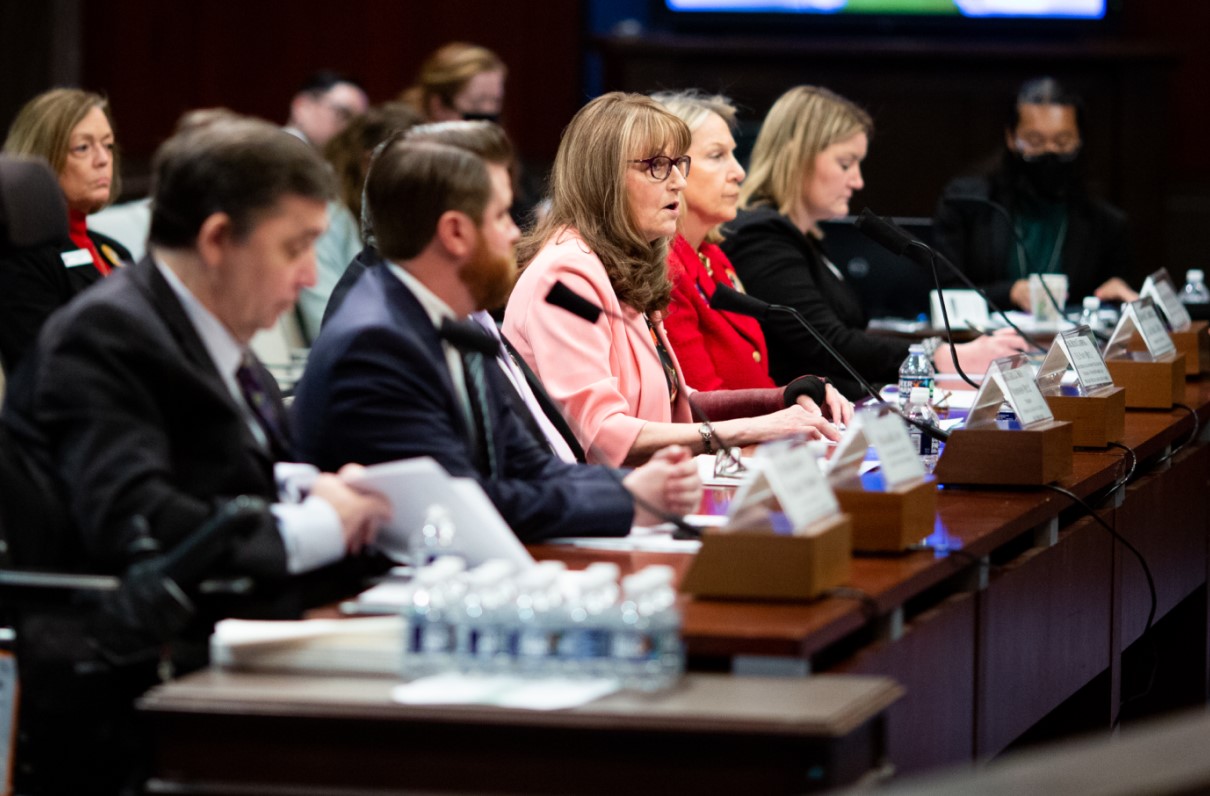MOAA outlined its legislative priorities for the VA on March 8 before a joint session of the Senate and House Veterans’ Affairs Committees, stressing the need for more predictable funding and improved oversight and accountability for the evolving department.
MOAA’s Senior Director of Government Relations Cmdr. René Campos, USN (Ret), called the continuing use of “stopgap measures” to fund the VA and the rest of the federal government in lieu of passing a budget “a worrying trend – a situation all too common.”
“MOAA is concerned about what these crises and budget threats will mean for current and future policy changes, which could dramatically alter VA’s funding requirements,” said Campos, citing the Independent Budget (IB) recommendations for the VA, prepared by the Veterans of Foreign Wars, Disabled American Veterans, and Paralyzed Veterans of America (PVA).
Campos also urged the committees to address “systemic issues” by filling the under secretary positions for both the Veterans Health Administration (VHA) and Veterans Benefits Administration (VBA). These positions, currently being filled in an interim basis, provide oversight and accountability at the top of the VA during its modernization process.
Other topics Campos addressed on Capitol Hill included:
- Stabilizing and modernizing the VHA’s workforce and support systems.
- Fast-tracking more support for long-term care facilities.
- Improving patient data quality of women, minorities, and underserved populations.
- Investing in behavioral health and suicide prevention.
- Passing meaningful veterans’ benefits on issues like toxic exposure.
- Providing better VA home loan oversight.
[READ MOAA’s WRITTEN TESTIMONY]
During her testimony, Campos mentioned a MOAA member who was considering dropping his health care due to staffing issues at the VA.
“I’ve been enrolled in the VA system in Monterey (California) for one year now,” the member wrote to MOAA. “… At first it seemed like a good system, but I’ve since learned it’s not user friendly and difficult to navigate. … I’ve tried working with the local ‘Patient Advocate,’ but she could not do much, plus like many, many other VA employees, she left.”
Campos also expressed MOAA’s support of the recently introduced Elizabeth Dole Home and Community Based Services for Veterans and Caregivers Act, which was referred to the House Committee on Veterans’ Affairs last month. The VA already had plans to create 200 new facilities or programs targeting geriatric or extended care by the end of 2026, a date that MOAA would like to see pushed up.
[RELATED: VA to Expand Extended-Care Services to All Medical Centers]
In addition to the Elizabeth Dole Act, Campos told the committee it was important for the VA to expand popular programs like Medical Foster Homes and Veteran Directed Care (VDC).
Campos’ brother, Meade, was a disabled veteran who could have benefitted greatly from such programs: He lived near a VA medical center but the facility did not offer either program, and VA staff was not helpful in coordinating health care to meet his medical needs, Campos said. Meade suffered from multiple mental and physical health issues before dying last year at the age of 65.
“As his long-distance caregiver and primary next-of-kin, I found the VA was not very helpful in my efforts to get him the services he needed at home,” Campos said.
[RELATED: Supreme Court Case Challenges VA Rules on Filing Deadlines, Back Pay]
Toxic exposure to burn pits in the Middle East and to Agent Orange during the Vietnam War were also popular topics of discussion at the committee hearing, which included MOAA and representatives from Paralyzed Veterans of America, Student Veterans of America, Gold Star Wives, National Guard Association of the United States, TAPS, Modern Military Association of America, and the American Defenders of Bataan and Corregidor Memorial Society (ABDC-MS).
Last month, the House of Representatives passed the Honoring our PACT Act, MOAA-supported legislation which would designate 23 respiratory illnesses and cancers as likely linked to toxic exposures from burn pits. The bill was received in the Senate on March 3.
[TAKE ACTION: Ask Your Senator to Support the Honoring Our PACT Act]
“Toxic exposure is hugely important to each and every one of us on this committee and certainly to those we serve,” said Sen. Jerry Moran (R-Kan.), ranking member of the Senate Committee on Veterans’ Affairs.
Rep. Mark Takano (D-Calif.), chairman of the House Committee on Veterans’ Affairs, said some of the legislation discussed by the veteran advocates “has already passed the 50-yard line.”
“We have got a lot of people on both sides of the aisle that want to move [legislation through],” Takano said. “It is my ambition that we have a banner year for veterans. But this will only happen with you and your members and your advocacy. We take our priorities from you.”
More Members Mean More Influence Over Retirement Pay, Health Care, and Family Programs
Get involved and make sure your interests are addressed. Because the larger our voice is, the greater our impact will be.

